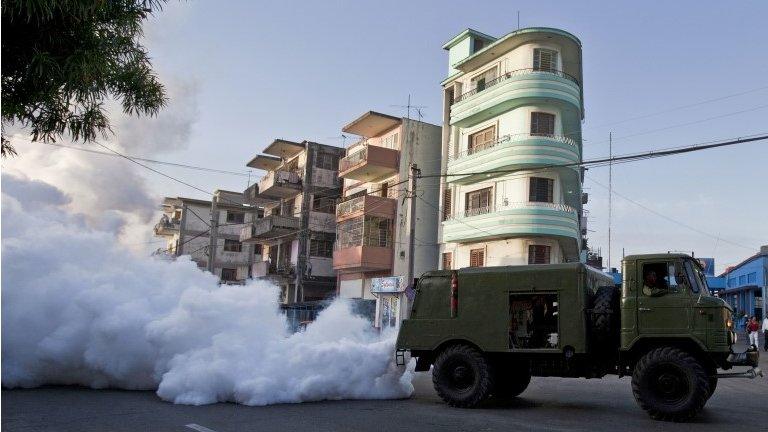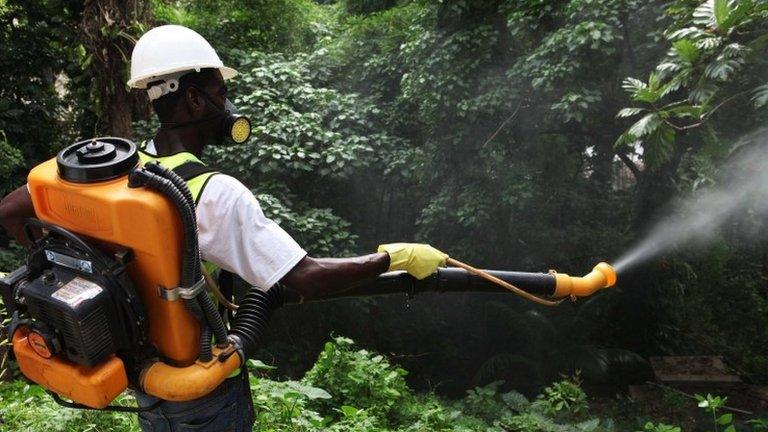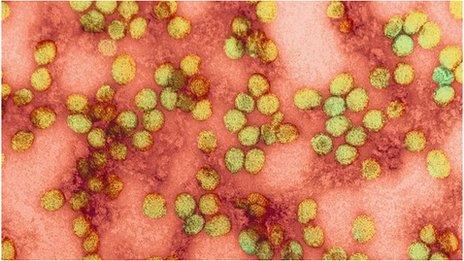Chikungunya revives herbal remedies in Antigua
- Published

Sira Berzas used herbal remedies to alleviate the symptoms of chikungunya
Sira Berzas winces when she remembers the pain.
The acute ache started in her ankles before quickly spreading through her body, crippling her muscles, pounding her joints and leaving her hands and feet severely swollen.
Last summer, the 38-year-old from Antigua and Barbuda was struck down with the debilitating chikungunya virus which has swept across the Caribbean infecting more than 800,000 people since it was first detected in the region in December 2013.
The mosquito-borne disease, which originated in Africa and has no known cure, is characterised by the abrupt onset of fever, deep joint and muscle pain, headache, nausea, fatigue and a rash.
"I was fine when I went to bed," Ms Berzas says, "but when I woke up in the morning and tried to get up my ankles hurt so much I couldn't stand. It was very scary. After that I started getting different pains all over my body. Soon my hands were so swollen I couldn't hold anything."
'Nothing worked'
Most patients recover fully although the pain can persist for several months or even years.
In older people the disease can cause death. According to World Health Organization figures, 176 fatalities across the Caribbean, Latin America and US were linked to the virus in 2014.
"I knew immediately it was chikungunya," Ms Berzas says.

Chikungunya

Viral disease spread by mosquitoes that bite during daylight hours
Currently, there is no specific treatment
No direct person-to-person transmission
Name derives from a word meaning "to become contorted" from the African Kimakonde language
Symptoms include the sudden onset of fever and joint pain, particularly affecting the hands, wrists, ankles and feet
Most patients recover after a few days but in some cases the joint pain may persist for weeks, months or even longer

"I didn't go to the doctor as it's expensive and everyone I knew who'd been to their GP was just told to take paracetamol and rest. I tried painkillers but nothing worked. The mornings were the worst; my joints were so stiff I could hardly move."
Ms Berzas is one of a growing number of sufferers who turned to natural remedies to alleviate the symptoms.
Alternative approach
In Antigua, where the minimum wage is just $3 (£2) per hour and a visit to a conventional doctor can set one back $44, herbalists specialising in "bush medicine" are often the first port of call.
"When I got desperate I went to Dr Amu, the naturopath. He gave me two teas to drink and an oil to rub on my skin. It soothed the rash and diminished the pain a lot. It didn't go away but at least it was manageable," Ms Berzas recalls.

Sylvester Tyrone "Amu" Motley is convinced his herbal remedies help alleviate the symptoms
It was four months before the aches finally abated.
"Even now, 10 months later, my ankles still hurt in the morning. I don't know how I would have coped if it hadn't been for Dr Amu; I recommended him to lots of people. Nothing else worked for me," Ms Berzas recalls.
'Plant power'
Self-taught naturopath Sylvester Tyrone "Amu" Motley prescribes a four-pronged approach to fighting chikungunya.
The first is a tea to be drunk three times daily on an empty stomach. It contains echinacea to boost the immune system, and chaparral and burdock root to purify the blood, ease pain and soothe the rash, he explains.

A selection of herbal remedies offered by Sylvester Tyrone "Amu" Motley

Mr Motley collects the plants for his herbal remedies in the countryside
Second is a detox made by boiling five different plants in fresh spring water.
"Arnica, soursop and cattle tongue are wonderful cure-alls," Mr Motley, who scours the local countryside looking for the plants, says.
"Then there's neem, which is an antiseptic, and dandelion to cleanse the body. That should be drunk all day long instead of water."
He also makes a special oil to be applied after bathing and at night on critical parts of the body.
A staunch advocate of the power of plants, Mr Motley says he has not had the illness himself and believes that is largely due to his own intake of herbs.
"It's tried to come a couple of times but my body fights it off," he adds.
Scepticism
In the absence of scientific evidence, conventional doctors are more sceptical.

Governments across the Caribbean are trying to prevent the spread of Chikungunya by spraying insecticides
Dr Nick Fuller, whose GP practice is based in Antigua's capital St John's, told the BBC: "Herbalism is not proven so I couldn't recommend it.
"But I don't see any harm in it," he adds.
"At the end of the day, chikungunya is a virus and needs to run its course," he explains.
With no antiviral medicines available yet to fight chikungunya, the only sure-fire way to deal with it is not to get it.
The government is therefore trying to stem the outbreak in Antigua, which has seen 1,442 suspected cases to date, through preventative measures.
They have stepped up insecticide spraying in communities and made bulk purchases of bed nets and repellent.
A public education campaign urges residents to avoid mosquito bites by wearing clothes that cover the arms, legs and feet and to use repellents.
- Published2 July 2014

- Published19 June 2014

- Published30 March 2014
